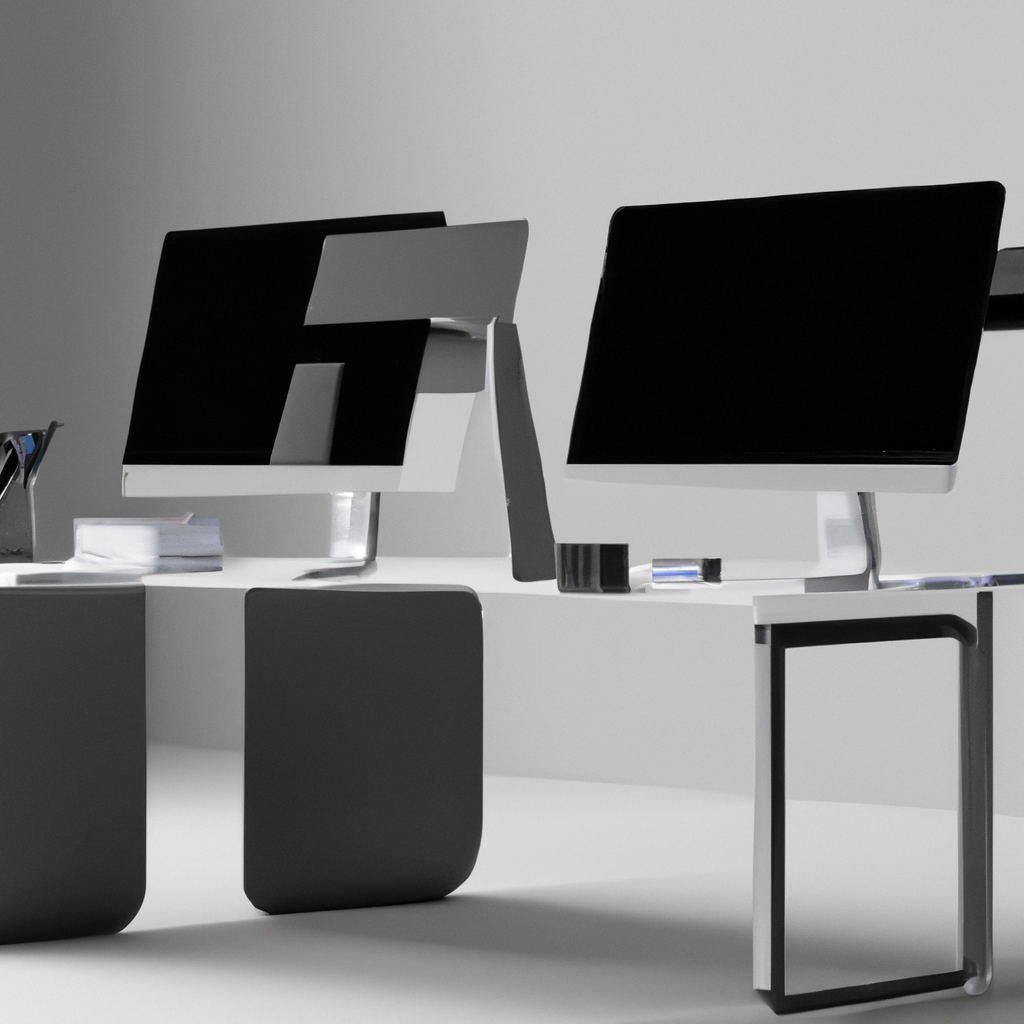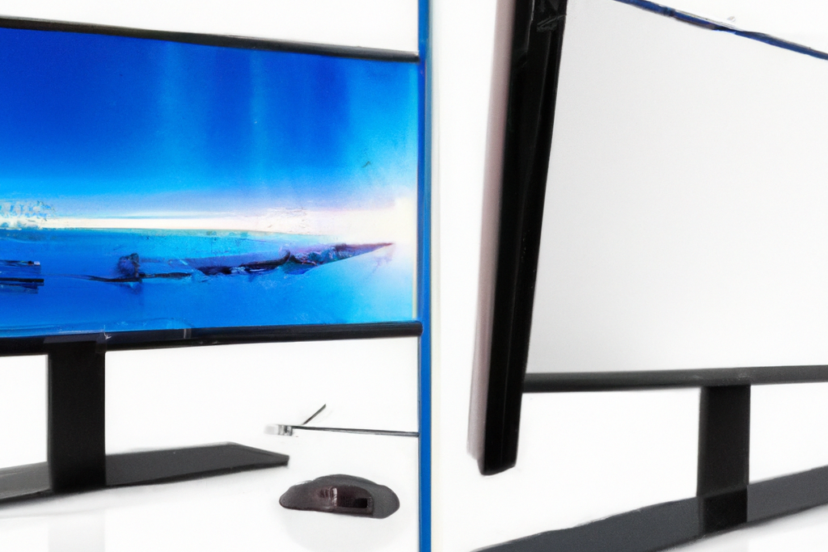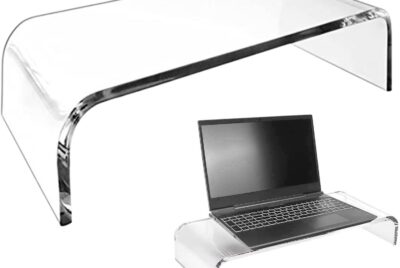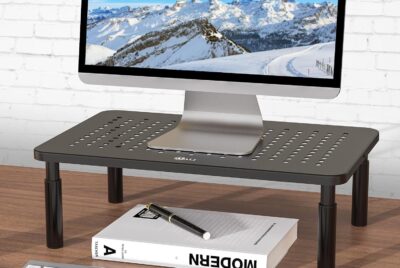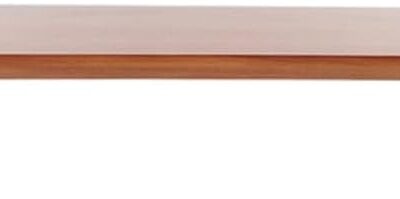Popular 1 Dual Monitor Stand For Desk
Looking to optimize your workspace and enhance your productivity? Look no further than the Dual Monitor Stand for Desk. This sleek and sturdy stand is specifically designed to hold two monitors, allowing you to multitask with ease and streamline your workflow. Say goodbye to cluttered desks and strained necks from constantly shifting between screens. With the Dual Monitor Stand for Desk, you can enjoy an ergonomic setup that promotes comfort and efficiency, all while adding a modern touch to your office decor. Say hello to a more organized and visually appealing workspace.
Benefits of Using a Dual Monitor Stand
Increased productivity
Using a dual monitor stand can greatly increase productivity. With two monitors, we can have multiple applications and documents open simultaneously, allowing us to work more efficiently. We no longer have to constantly switch between tabs or windows, reducing distractions and saving time. Whether we’re working on a project, doing research, or even gaming, having two monitors can significantly enhance our productivity.
Ergonomic advantages
Another benefit of using a dual monitor stand is the ergonomic advantages it offers. With the ability to adjust the height and angle of the monitors, we can customize the setup to our preferred viewing position. This helps reduce strain on our neck, back, and eyes, preventing common issues such as neck pain and eye fatigue. By maintaining good posture and ergonomics, we can work comfortably for longer periods of time without experiencing discomfort or potential health problems.
Maximizing desk space
One of the key advantages of using a dual monitor stand is the ability to maximize desk space. By elevating the monitors off the desk, we free up valuable workspace for other items such as a keyboard, mouse, and documents. This is particularly beneficial for those with limited desk space or those who prefer a clean and organized work environment. A dual monitor stand allows us to efficiently utilize the available space and keep our desk clutter-free.
Improved multitasking
The ability to multitask effectively is crucial in today’s fast-paced work environment. A dual monitor stand enables us to seamlessly switch between applications and tasks, boosting productivity. We can have multiple documents open side by side, compare data effortlessly, or even chat with colleagues while working on a project. This flexibility and ease of multitasking are especially valuable for professionals who need to juggle multiple tasks simultaneously.
Seamless multi-monitor setup
Setting up multiple monitors can be a daunting task, but with a dual monitor stand, the process becomes much simpler. The stand provides a sturdy and stable base for the monitors, ensuring they remain securely in place. It eliminates the need for individual monitor mounts or additional accessories, streamlining the setup process. With a dual monitor stand, we can easily align and position our monitors for a seamless and immersive viewing experience.
Factors to Consider Before Purchasing a Dual Monitor Stand
Monitor compatibility
Before purchasing a dual monitor stand, it’s important to consider the compatibility with our monitors. We need to ensure that the stand is compatible with our monitor sizes and weights. Most dual monitor stands have specifications listing the compatible monitor sizes and weights, so we should check these specifications before making a purchase.
Weight capacity
Different dual monitor stands have varying weight capacities. It’s crucial to select a stand that can safely support the weight of our monitors. Ideally, we should choose a stand with a weight capacity that exceeds the combined weight of our monitors. This ensures that the stand will remain stable and secure, preventing any potential accidents or damage to our monitors.
Adjustability options
The adjustability options of a dual monitor stand are also important factors to consider. We should look for stands that offer height adjustment, tilt and swivel capabilities, as well as rotation and pivot functions. These adjustable features allow us to customize the monitor position and angles to our preferred viewing position, providing optimal comfort and ergonomics.
Installation and setup
The installation and setup process can vary depending on the type of dual monitor stand we choose. It’s important to consider our own skill level and comfort with setting up such equipment. Some stands may require drilling or using specific tools, while others have a more straightforward installation process. We should carefully review the installation instructions and ensure that we have the necessary tools and knowledge before making a purchase.
Cable management
Cable management is often overlooked but is an important aspect to consider when purchasing a dual monitor stand. With multiple monitors, there are more cables to manage, and a cluttered workspace can be distracting and unappealing. It’s beneficial to choose a stand that offers built-in cable management features, such as cable clips or channels, to keep the cables organized and out of sight.
Quality and durability
The quality and durability of a dual monitor stand are essential factors to consider. We want to invest in a stand that is built to last and can withstand the daily wear and tear of regular use. Reading customer reviews and researching the brand’s reputation can provide insights into the quality and durability of the stand. It’s worth investing in a higher-quality stand to ensure longevity and stability for our monitors.
Price and budget
Lastly, we need to consider our budget and the price range of dual monitor stands. Dual monitor stands can vary significantly in price, depending on the brand, features, and build quality. It’s important to determine our budget and prioritize the features that are most important to us. While price is an important factor, it’s also crucial to consider the long-term value and durability of the stand.
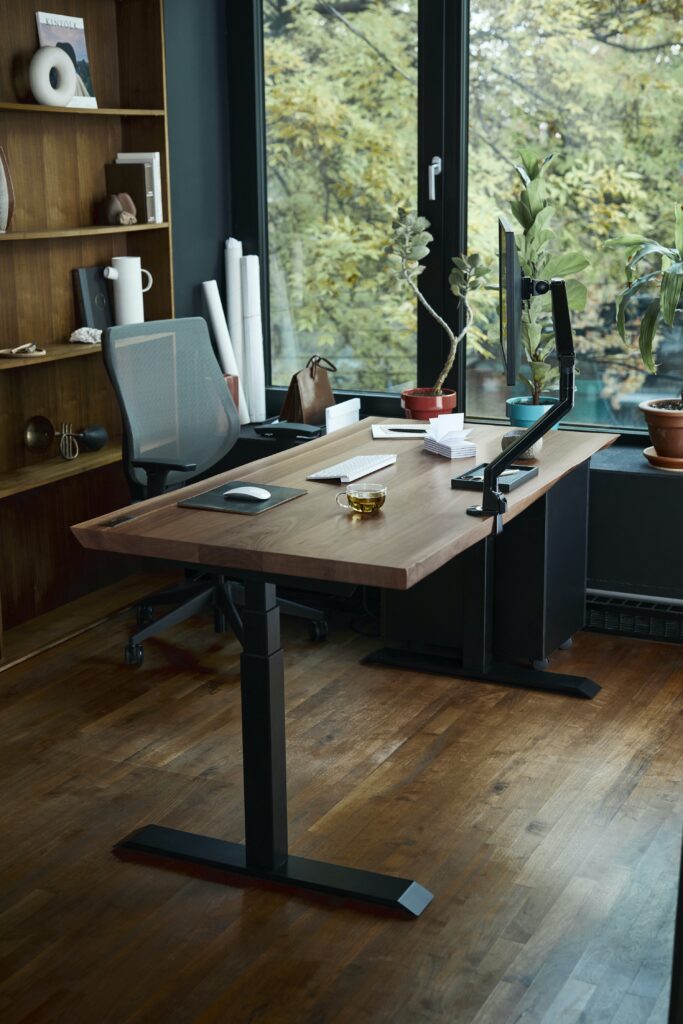
Different Types of Dual Monitor Stands
Freestanding dual monitor stands
Freestanding dual monitor stands are a popular choice for those who want a versatile and portable option. They typically consist of a sturdy base, with individual arms for each monitor. These stands offer flexibility in terms of monitor positioning and can be easily adjusted or moved on the desk. Freestanding dual monitor stands are ideal for those who may need to frequently rearrange their workspace or work on multiple locations.
Clamp-on dual monitor stands
Clamp-on dual monitor stands provide a space-saving solution for those with limited desk space. These stands attach directly to the edge of the desk using a clamp, eliminating the need for a bulky base. They are adjustable and allow for various positioning options. Clamp-on dual monitor stands are suitable for those who want a clean and minimalist setup or need to maximize their available workspace.
Grommet dual monitor stands
Grommet dual monitor stands are similar to clamp-on stands, but instead of using a clamp, they utilize the pre-existing grommet holes in the desk. These stands provide a more secure and stable mounting option, as they are bolted directly to the desk. Grommet dual monitor stands offer a clean and professional look, making them popular in office environments.
Wall-mounted dual monitor stands
For those who want to free up desk space entirely, wall-mounted dual monitor stands are a great choice. These stands require securely attaching the monitors to the wall using a mounting bracket. Wall-mounted dual monitor stands provide the ultimate space-saving solution and offer a sleek and elegant look. However, they do require careful planning and installation to ensure proper positioning and stability.
Desk-mounted dual monitor stands
Desk-mounted dual monitor stands are a common and versatile option for those who want stability and flexibility. These stands typically consist of a central pole that is mounted to the desk, with multiple arms for each monitor. They provide a stable and secure base while allowing for adjustable positioning. Desk-mounted dual monitor stands are suitable for most desk setups and offer a wide range of customization options.
Pole-mounted dual monitor stands
Pole-mounted dual monitor stands are similar to desk-mounted stands but utilize a single pole instead of a central column. These stands are a space-saving option and provide a clean and minimalistic look. They are typically attached to the rear edge of the desk and offer adjustable height, tilt, and swivel options. Pole-mounted dual monitor stands are ideal for those who want a simple yet functional setup.
Features to Look for in a Dual Monitor Stand
Adjustable height
One of the most important features to look for in a dual monitor stand is adjustable height. The ability to raise or lower the monitors allows us to find the perfect viewing position. This is especially important for maintaining proper ergonomics and reducing strain on our neck and back. Adjustable height also enables us to position the monitors at eye level, preventing eye fatigue and discomfort.
Tilt and swivel
Tilt and swivel functionality is another vital feature in a dual monitor stand. Tilt allows us to adjust the angle of the monitors, providing optimal viewing comfort. Swivel capability enables us to rotate the monitors horizontally, allowing for easy sharing of information and collaboration. Both tilt and swivel options contribute to better ergonomics and improve the overall viewing experience.
Rotation and pivot
Rotation and pivot features are particularly useful for those who need to switch between landscape and portrait modes regularly. Rotating the monitors 90 degrees allows us to view documents or web pages in portrait mode, which can be beneficial for reading or editing long documents or coding. The ability to rotate and pivot the monitors offers greater versatility and adaptability to different tasks and preferences.
VESA compatibility
VESA compatibility is an essential consideration when choosing a dual monitor stand. VESA is a standard for mounting monitors, and most monitors have VESA-compliant mounting holes on their back. It’s important to ensure that the stand we choose is compatible with the VESA pattern of our monitors. This ensures a secure and stable mounting and prevents any issues with compatibility.
Built-in cable management
Cable management is often a challenge when setting up multiple monitors. Look for dual monitor stands that offer built-in cable management features to keep the cables organized and hidden from view. Cable clips, channels, or routing options can help prevent cable tangling and clutter, creating a clean and neat workspace. Good cable management not only improves aesthetics but also reduces the risk of accidental disconnections or damage to the cables.
Sturdy construction
A dual monitor stand should have a solid and sturdy construction to ensure stability and durability. Look for stands made from high-quality materials, such as steel or aluminum, that can withstand the weight of the monitors without wobbling or sagging. A sturdy construction helps to prevent accidents and damage to the monitors, ensuring a safe and reliable setup.
Easy installation
Unless we have experience with mounting monitors and setting up stands, it’s important to choose a dual monitor stand that is easy to install. Look for stands with a straightforward installation process and clear instructions. Some stands may require specific tools or drilling, while others may have a tool-less or quick-release mechanism. Easy installation saves us time and minimizes the risk of errors or complications during setup.
Space-saving design
To make the most of our desk space, consider a dual monitor stand with a space-saving design. It should have a compact footprint and not take up unnecessary space on the desk. Some stands offer integrated storage options, such as shelves or hooks, for small items like smartphones or headphones. A space-saving design helps maintain an organized and efficient workspace.
Additional accessories
Some dual monitor stands come with additional accessories that can enhance the functionality and convenience of the setup. These accessories may include a monitor arm extension, a laptop holder, or even a built-in USB hub. Consider the specific needs and requirements of our work setup and choose a stand that offers the necessary accessories to meet those needs.
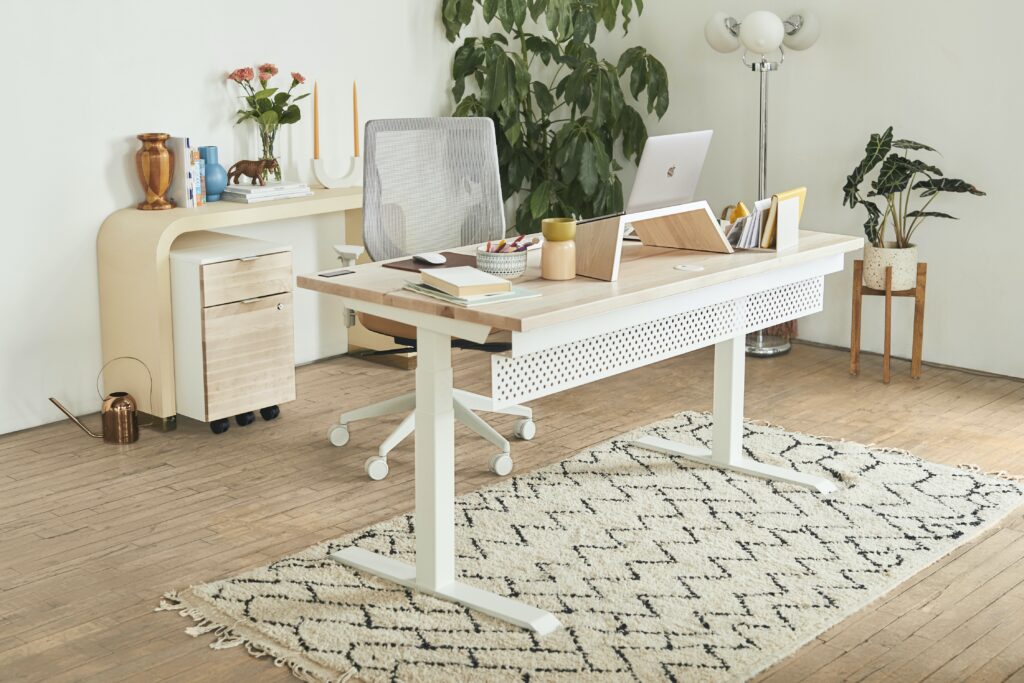
Step-by-Step Guide to Setting Up a Dual Monitor Stand
Measure and prepare your desk space
Before setting up a dual monitor stand, measure the available desk space and ensure it can accommodate the stand and monitors. Clear the desk of any clutter and remove any obstructions that may interfere with the setup.
Assemble the dual monitor stand
Refer to the manufacturer’s instructions and assemble the dual monitor stand according to the provided guidelines. Ensure that all necessary components and tools are available before starting the assembly process.
Mount the monitors
Attach the monitors securely to the dual monitor stand using the VESA mounting holes on the back of the monitors. Make sure to follow the instructions and use the appropriate screws and brackets provided by the manufacturer.
Adjust the position and angles
Once the monitors are mounted, adjust their position and angles to your desired viewing position. Use the height, tilt, swivel, rotation, and pivot adjustments to find the most comfortable and ergonomic setup.
Manage cables and connections
Organize and manage the cables by using the cable management features of the dual monitor stand. Route the cables through cable clips or channels to prevent tangling and keep them hidden from view. Connect the cables to the appropriate ports on the monitors and computer.
Test and fine-tune the setup
Power on the monitors and test the setup to ensure everything is functioning correctly. Make any necessary adjustments or fine-tuning to the monitor positions and angles based on personal preferences and comfort.
Tips for Optimizing Your Dual Monitor Setup
Align the monitors for a seamless display
To create a seamless display, align the monitors so that the edges of the screens are at the same height and level. This ensures a consistent and uninterrupted flow of content across both screens. Adjust the tilt and swivel angles to achieve a smooth transition between the two monitors.
Use proper ergonomics
Maintain proper ergonomics by ensuring that the top of the monitors is at or slightly below eye level. This prevents strain on the neck and reduces eye fatigue. Position the monitors directly in front of you, with a comfortable viewing distance to avoid unnecessary strain on the eyes and neck.
Adjust the monitor height
Experiment with different monitor heights to find the most comfortable and ergonomic position. The height should be adjusted so that the monitors are at eye level, allowing for a natural and comfortable viewing experience. This helps reduce neck strain and promotes better posture.
Consider an additional monitor mount
If the dual monitor stand does not provide enough flexibility or if we want to add more monitors to the setup, consider investing in an additional monitor mount. This allows for greater customization and expandability, ensuring that the setup can grow with our needs.
Calibrate and color match the monitors
To achieve accurate and consistent colors across both monitors, calibrate and color match them. Use monitor calibration tools or software to adjust the color, brightness, and contrast settings to ensure a uniform display. This is particularly important for tasks that require color accuracy, such as graphic design or photo editing.
Utilize software for multi-monitor management
Take advantage of software options available for multi-monitor management. These software tools allow us to customize and control various aspects of the dual monitor setup, such as window management, display profiles, and screen orientation. They can greatly simplify and enhance the overall multi-monitor experience.
Organize desktop layout and workflow
Optimize your desktop layout and workflow to maximize productivity. Arrange frequently used applications and documents on the primary monitor, while using the secondary monitor for additional tasks or reference materials. Customize the desktop icons and shortcuts for quick access and organization. Experiment with different layouts and workflows to find the most efficient setup for your specific workflow.
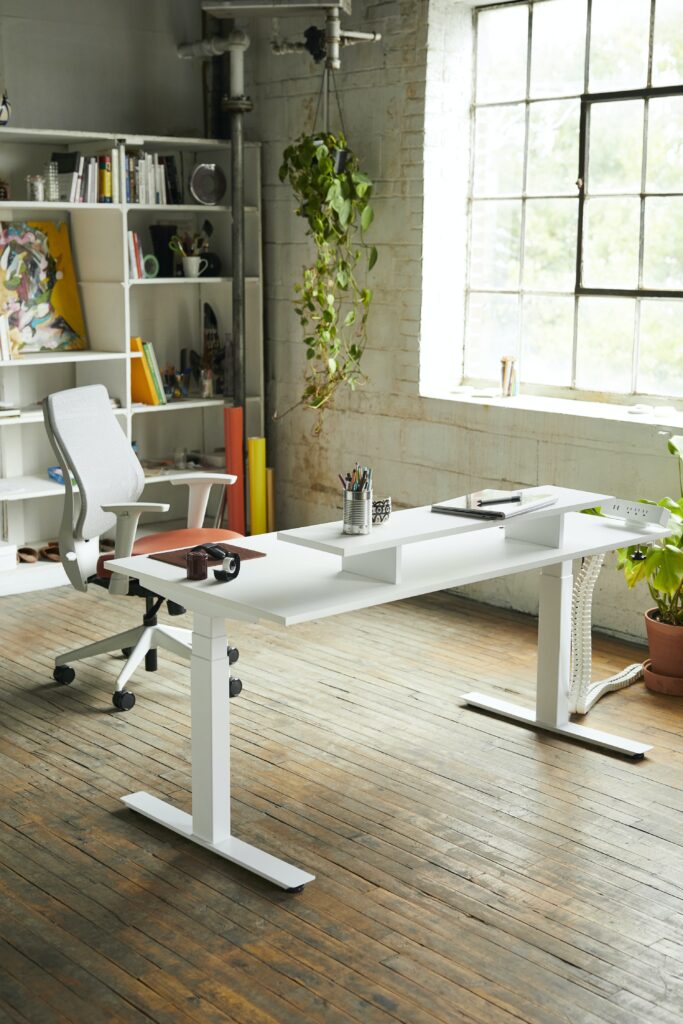
Common Issues and Troubleshooting
Monitor wobbling or instability
If the monitors wobble or are unstable on the dual monitor stand, ensure that they are securely mounted and tightened. Check if the stand is properly aligned and balanced. If the wobbling persists, consider upgrading to a sturdier dual monitor stand with a higher weight capacity.
Monitor compatibility issues
If the dual monitor stand is not compatible with your monitors, double-check the VESA compatibility and monitor size specifications. Ensure that the stand can accommodate the weight and size of your monitors. If compatibility remains an issue, consider researching alternative stands or contacting the manufacturer for support.
Cable tangling and clutter
To prevent cable tangling and clutter, utilize the built-in cable management features of the dual monitor stand. Route the cables through cable clips or channels and use zip ties or cable organizers to secure them. Ensure that the cables are not pulled tightly or twisted to prevent damage.
Limited adjustability
If the dual monitor stand has limited adjustability options, consider using additional accessories such as monitor arm extensions or swivel adapters. These accessories can provide extra flexibility in positioning and angles.
Non-uniform monitor alignment
If the monitors are not aligned properly or are not level, readjust the position and tilt angles. Ensure that the edges of the screens are aligned and level. Use a level tool or adjust the stand’s horizontal alignment to achieve a uniform monitor alignment.
Screen flickering or image distortion
Screen flickering or image distortion can be caused by various factors, including incompatible monitor settings, outdated display drivers, or faulty cables. Troubleshoot the issue by checking and adjusting the monitor settings, updating the display drivers, or replacing the cables if necessary.
Top 5 Dual Monitor Stands in the Market
Brand A Dual Monitor Stand
Brand A’s dual monitor stand offers a sturdy construction and a wide range of adjustability options. With its high weight capacity and versatile design, it can accommodate most monitor sizes and weights. The stand comes with built-in cable management features and is easy to install. Customers highly rate its durability and value for money.
Brand B Dual Monitor Stand
Brand B’s dual monitor stand is known for its sleek and minimalist design. It offers seamless adjustability and a compact footprint, making it an ideal choice for those with limited desk space. The stand’s adjustable height, tilt, swivel, and rotation features provide optimal viewing comfort. Customers appreciate its solid construction and ease of installation.
Brand C Dual Monitor Stand
Brand C’s dual monitor stand stands out for its exceptional stability and weight capacity. It can support larger monitors and offers extensive adjustability options, including height adjustment and rotation. The stand’s sturdy base and high-quality materials ensure long-lasting durability. Customers praise its versatility and ability to hold heavy monitors securely.
Brand D Dual Monitor Stand
Brand D’s dual monitor stand combines functionality with aesthetics. With its elegant design and high weight capacity, it can accommodate various monitor sizes and weights. The stand offers smooth tilt, swivel, and rotation adjustments, allowing for effortless positioning. Customers appreciate its ease of assembly and premium build quality.
Brand E Dual Monitor Stand
Brand E’s dual monitor stand is known for its exceptional value and affordability. Despite its budget-friendly price, it offers a solid and stable construction. The stand provides sufficient adjustability options for most users, including tilt and rotation. Customers commend its simplicity and cost-effectiveness.
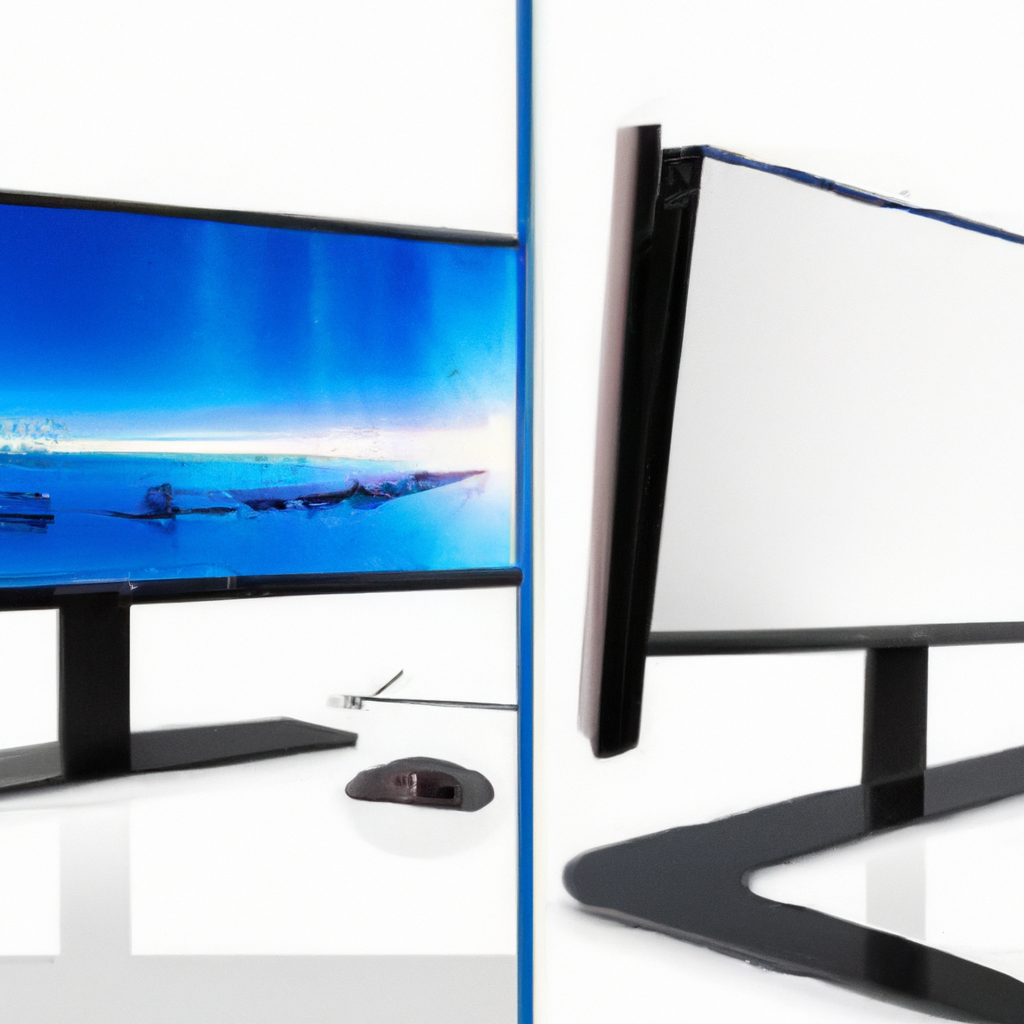
Comparison of Dual Monitor Stand Brands
Price range
Brand A: $$$ Brand B: $$ Brand C: $$$ Brand D: $$$ Brand E: $
Weight capacity
Brand A: Up to 20 lbs per monitor Brand B: Up to 15 lbs per monitor Brand C: Up to 25 lbs per monitor Brand D: Up to 30 lbs per monitor Brand E: Up to 10 lbs per monitor
Adjustability options
Brand A: Height, tilt, swivel, and rotation adjustments Brand B: Height, tilt, and swivel adjustments Brand C: Height, tilt, swivel, and rotation adjustments Brand D: Height, tilt, swivel, and rotation adjustments Brand E: Tilt and swivel adjustments
Customer reviews and ratings
Brand A: 4.5/5 Brand B: 4/5 Brand C: 4.8/5 Brand D: 4.7/5 Brand E: 4/5
Warranty and customer support
Brand A: 1-year warranty with responsive customer support Brand B: 2-year warranty with satisfactory customer support Brand C: 3-year warranty with excellent customer support Brand D: 2-year warranty with reliable customer support Brand E: 1-year warranty with decent customer support
Conclusion
Selecting the right dual monitor stand can greatly enhance productivity, ergonomics, and overall comfort. Consider the benefits of increased productivity, ergonomic advantages, maximized desk space, improved multitasking, and seamless multi-monitor setup. Before purchasing, evaluate factors such as monitor compatibility, weight capacity, adjustability options, installation and setup, cable management, quality and durability, and price and budget. Choose a dual monitor stand that suits your specific requirements and preferences, and offers features such as adjustable height, tilt and swivel, rotation and pivot, VESA compatibility, built-in cable management, sturdy construction, easy installation, space-saving design, and additional accessories. Follow the step-by-step guide to setting up a dual monitor stand, optimize your dual monitor setup with proper alignment, ergonomics, and workflow organization. Be aware of common issues and troubleshooting methods, and consider the top brands and their features. By carefully considering these factors, you can select the right dual monitor stand to enhance productivity, comfort, and overall work experience.
